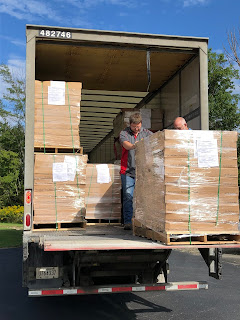Logistics in Industrial Sanitation: A Critical Factor for Delivery Efficiency
Logistics plays a crucial role in the industrial sanitation and food safety industry, particularly when it comes to delivering chemicals and sanitation products to facilities like food processing plants, breweries, and dairy operations. Efficient logistics are vital to ensure that businesses receive the right products at the right time, allowing them to maintain uninterrupted operations and meet stringent food safety standards.
As the demand for specialized cleaning solutions continues to grow, so does the need for reliable, fast, and cost-effective transportation. The challenge lies in managing the distribution of these products, which are often hazardous or sensitive to environmental factors such as temperature and humidity. Timely delivery is essential to prevent production downtime, ensure compliance with sanitation protocols, and maintain the overall quality of the products being manufactured.

The Role of Specialized Transport
Transporting chemicals, especially those used in industrial sanitation, requires specialized logistics solutions. These products are often regulated due to their chemical composition, meaning that transport companies must follow strict safety and compliance measures. Additionally, certain sanitation products may need temperature-controlled environments or specific handling procedures to maintain their effectiveness during transit.
In this context, PNW Transport is an ideal logistics partner. This company specializes in delivering industrial products, including those used in sanitation and food safety, across the Pacific Northwest. With capabilities such as dedicated trucking, experienced drivers, and a focus on timely, compliant deliveries, PNW Transport ensures that companies in the sanitation industry can receive their supplies efficiently.
PNW Transport’s flexibility in providing regional and long-haul transport options allows it to meet the logistical demands of this highly regulated industry. By working with transport partners like PNW Transport, companies in the industrial sanitation sector can reduce the risk of delays, streamline their supply chains, and ensure that their sanitation protocols are upheld without interruptions.
Moreover, PNW Transport’s experience with handling time-sensitive and hazardous materials makes them a valuable asset for businesses that need to maintain consistent production schedules. Their services align with the growing need for enhanced logistical efficiency in the food safety and sanitation sectors, ensuring that essential supplies reach their destination safely and on time.
The Future of Logistics in the Sanitation Industry
As the industrial sanitation sector continues to evolve, logistics will play an increasingly important role in ensuring the smooth distribution of products. Advances in logistics technology, including real-time tracking, automated inventory systems, and data analytics, are transforming how products are managed and delivered. For companies in this industry, working with logistics providers that can adapt to these innovations will be key to staying competitive.
In summary, logistics is a critical component of the industrial sanitation and food safety industry. Companies that can streamline their supply chains by partnering with reliable transport providers like PNW Transport will be better equipped to handle the challenges of delivering specialized, regulated products. This collaboration not only ensures operational efficiency but also enables companies to maintain compliance with ever-changing industry standards.
